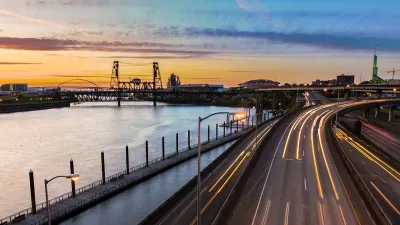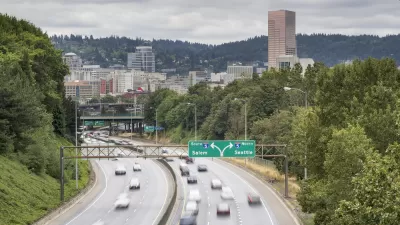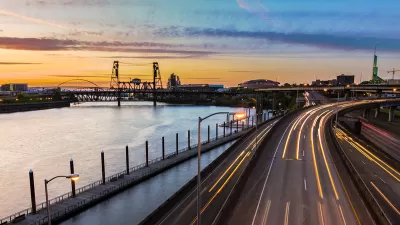The I-5 Rose Quarter project has proven controversial throughout the study and planning process, and now it's losing key local political support.

"A state project to expand Interstate 5 through the Rose Quarter lost major support Tuesday after a community nonprofit leading an effort to revitalize the nearby Albina neighborhood and city, county and regional elected officials announced they no longer support the plan," reports Everton Baily.
The Albina Vision Trust was the organization that withdrew its support for the plan. "The nonprofit’s mission is to help restore and revitalize the Albina neighborhood that in the last century was home to 80% of Portland’s Black population before most of those residents were displaced through eminent domain, gentrification and racism," explains Bailey.
The Albina Vision Trust has been voicing concerns about the project since January, and organization said in its statement that the plan hadn't evolved since that time.
Since the Albina Vision Trust withdrew its support, "Portland Bureau of Transportation Commissioner Chloe Eudaly and Portland Mayor Ted Wheeler have both pulled their support as well. This means ODOT is left trying to complete a controversial mega-project that doesn’t have support from the very city it would be built in," according to a separate article by Jonathan Maus.
After those local leaders withdrew their support, Oregon Governor Kate Brown chimed in too.
"Gov. Kate Brown said Wednesday that the planned widening of Interstate 5 through the historic Albina neighborhood that was once home to nearly 80% of Oregon’s Black population will not happen without the support of Portland’s Black community," reports Betsy Hammond, in yet another article tracking the shifting political landscape for the project.
Brown stopped short, however, of withdrawing support from the Rose Quarter project, "which the Oregon Legislature authorized and agreed to fund under a mammoth 2017 transportation package."
Previous Planetizen coverage of the I-5 Rose Quarter project.
FULL STORY: Community nonprofit, Portland-area elected officials say they no longer support I-5 Rose Quarter project

Planetizen Federal Action Tracker
A weekly monitor of how Trump’s orders and actions are impacting planners and planning in America.

Maui's Vacation Rental Debate Turns Ugly
Verbal attacks, misinformation campaigns and fistfights plague a high-stakes debate to convert thousands of vacation rentals into long-term housing.

Restaurant Patios Were a Pandemic Win — Why Were They so Hard to Keep?
Social distancing requirements and changes in travel patterns prompted cities to pilot new uses for street and sidewalk space. Then it got complicated.

In California Battle of Housing vs. Environment, Housing Just Won
A new state law significantly limits the power of CEQA, an environmental review law that served as a powerful tool for blocking new development.

Boulder Eliminates Parking Minimums Citywide
Officials estimate the cost of building a single underground parking space at up to $100,000.

Orange County, Florida Adopts Largest US “Sprawl Repair” Code
The ‘Orange Code’ seeks to rectify decades of sprawl-inducing, car-oriented development.
Urban Design for Planners 1: Software Tools
This six-course series explores essential urban design concepts using open source software and equips planners with the tools they need to participate fully in the urban design process.
Planning for Universal Design
Learn the tools for implementing Universal Design in planning regulations.
Heyer Gruel & Associates PA
JM Goldson LLC
Custer County Colorado
City of Camden Redevelopment Agency
City of Astoria
Transportation Research & Education Center (TREC) at Portland State University
Jefferson Parish Government
Camden Redevelopment Agency
City of Claremont




























